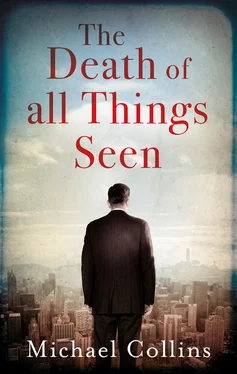Joanne continued to stare into the dark. It was her fault, surely. Roger Carlyle had watched the whole thing from the café. He had acted in the interest of the community after all, cut his losses in seeing Joanne’s alignment with Norman. She imagined Carlyle might make the police blotter, inculcating himself further into the community: Realtor foils drug deal , or whatever charges the police filed against Norman.
Joanne admitted it against herself. She had found Roger Carlyle attractive. He was one of those professional men full of self-importance who had somehow always eventually passed on her. It had happened when she had been working at a bookshop, before she met Peter. She’d had a succession of relationships that ended most often with men bedding her and leaving her. It was the reality of the modern world.
There had been one among them she’d thought different. Robert Hoyt, a soft-faced, lanky lawyer who had tipped his head slightly when listening to her, presumably because of his height, when, later in bed with him, he had asked her to speak into his good ear, revealing then how he had suffered a fever as a child that had affected his hearing.
Joanne shuddered and closed her eyes. She saw him as she had first seen him brown-bagging a lunch and paging through a book on Cubism at the store where she had worked. Robert Hoyt who had talked so openly of wanting to be an artist, as though it could be communicated to her alone, when, all along, he had only used her as a foil against the unstoppable influence of good breeding on his life, and understanding it eventually, how no act, no matter how scandalous, could make up for a lack of true talent.
That is what she had been for him, the deciding influence of a flirtatious bad choice that might have ruined him, so that right on the six-month anniversary of unprotected sex, as though an experiment had been completed, he flat-out stopped calling her, swapping her out for a former lawyer classmate with a sparrow’s face.
You could drive yourself mad trying to understand it. What Joanne remembered were those times Robert used to stand in the pale light after being with her, the lie of it yet concealed, Robert Hoyt rising to stare back at the city from his skyline apartment, brushing his teeth, the rote up and down strokes and the side to side motion that he had learned in childhood and carried with him, and then back in bed again, reaching and drawing her to him so his breath was on her neck in the smell of mint and good hygiene.
*
Joanne looked into the sullen deadness of the bus. There were events in a life that would never make sense. She consciously blanked Robert Hoyt from her life.
There was something old world about the bus, the yellowish buttery light, almost sepia, so it seemed like a movie set, some compartmentalized scene from the past. And then she had a thought of how it did remind her of a movie she had once seen about a kidnapping, a movie about a GI, down on his luck, who had bullied a girlfriend to participate in a Lindbergh-style kidnapping.
Joanne had watched the movie with Peter, both of them witnessing the disconsolate act of what people, even back then, had been forced to do, when a soldier’s service seemingly had not been enough, and nothing was gained in coming home. It had been so terribly sad: a small child of rich parents, a house over from where the girlfriend worked, led to a park by the girlfriend, then taken to an awaiting car, because who wouldn’t want to ride with a genuine GI?
In closing her eyes, Joanne let the throb of the diesel engine go through her, remembering how the girlfriend had not intervened in the child’s inevitable murder, the kidnapping abandoned with no money gained. It had seemed so utterly hopeless, the dispirited sense of an afternoon so long ago spent with Peter when it was apparent that he would never make it, both of them watching the film in the quieting understanding that something profound was being communicated, and being played for them alone.
Toward the end of the film, Joanne recalled the starkness of the final scene in the small farmhouse, the GI boyfriend seated at a kitchen table. He had a gun in his lap, his head in the fold of his arms, and the child whimpering in a closet. The scene was shot from the girlfriend’s perspective, so there was no reprieve for her or the GI — the camera, in the long close-up, revealing in the GI’s face, a life being consumed and used up even in sleep.
Joanne took a deepening breath. She was struggling now. An embittered feeling surfaced against her parents. They were at the locus of a point where she might have been saved, when there might have been an alternative, and they had abandoned her. Her shoulders shrugged in the uneasy assessment of her life, and beneath it she felt the unrecorded hum of implication in all that had come before, and would come, and accounted for life, the register of decisions, moments that could never be fully understood or altered.
How often in life was there truly no place to go? She was back where she had been on New Year’s Eve, on the precipice of boarding a bus back to Buffalo and landing at Sheryl and Dave’s door. She felt the deep rush of humiliation. She had caused this, in putting the pot in Grace’s suitcase.
What would they say about her if she tried to return? She used the heel of her hand against her nose.
What she wanted to say to them collectively! She felt a surge of anger. They deserved blame! Not least for the Thanksgiving when she had showed up, bereft of a real future, when they might have said something sympathetic, and offered up hollow words that she was welcome back home, when they knew she wouldn’t have taken them up on the offer, but it would have been a show of compassion, or at least concern.
Whom did she hate most? It was difficult deciding, but she laid blame on her parents for their disregard for her in the years after college, when they had actively kept her in abeyance. They had argued that there were no jobs, no future in Buffalo, and yet Sheryl had stayed and had been eventually accommodated after all the grief she had caused in marrying Dave.
Yes, that was the charge she laid against them, their collective indifference. When Sheryl had gone through early menopause and had her hysterectomy, she had the support of a mother meeting the kids off the school bus, supper already in the oven — a casserole and corn bread — and Dad coming on the weekends, sleeping on the pull-out couch and taking the kids to a middle school night football game.
What it had done was allow Dave to continue out on the road, because the money was needed and no opportunity to drive long haul as a contractor could be declined, non-union work, non-negotiable. You served the interests that hired you, put up and shut up, or you weren’t contracted again, which led to a survival instinct that calcified around an abiding creed of faith and self-reliance, so what was gained was gained with the Lord’s favor, because you couldn’t afford enemies, not in this world or the Hereafter.
Joanne knew everything about their lives, the straight truth and the contradictions, what made them who they were. She even had a sympathetic understanding of what it took to survive. It was just that they hadn’t extended that degree of understanding to her.
How often did she think of her parents, and of Sheryl and Dave, and how often did they think of her? It was a sobering and hurtful reality. She knew the answer in their preoccupation with their existence, in the reach of Misty’s unrealized dreams, and the great resuscitation of new dreams, so a gold medal at the Olympics, or the dream of it, was passed over, eventually, for the love of a guy in a pickup truck who looked like every other guy in a pickup truck.
There was a trick there somewhere, a willful lack of insight, paving over ambition in the sullen settling of life, like a house settled on its foundation in its creaks, groans and cracks. Life, she understood, was a succession of failures, with the oddment of small victories here and there that needed to be cherished, remembered and fanned. They had denied her this.
Читать дальше












